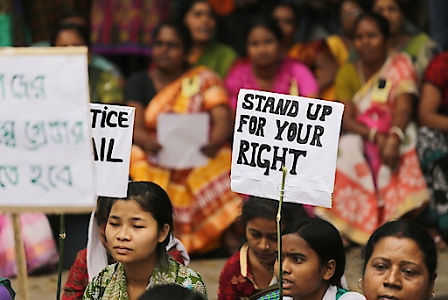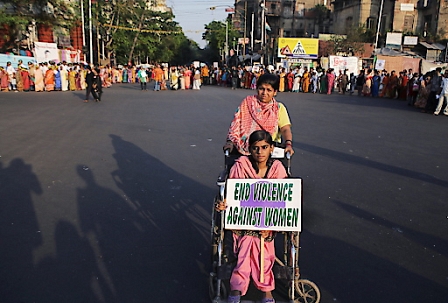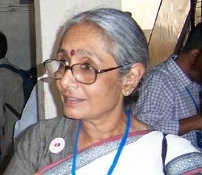Erstellt am: 21. 3. 2015 - 14:30 Uhr
"We have been fighting rape for years"
Indien ist seit einer besonders brutalen Vergewaltigung, immer wieder mit ähnlichen Fällen von sexueller Gewalt in den Schlagzeilen: Im Dezember 2012 in Neu-Delhi steigt eine 23-jährige Studentin mit ihrem Freund nach einem Kinobesuch in einen Bus, um nach Hause zu fahren. Ihr Begleiter wird von sechs Männern mit einer Eisenstange bewusstlos geschlagen. Anschließend vergewaltigen die Männer die Frau so brutal, dass sie später an den Folgen stirbt.
Der ORF hat die Doku "India's Daughter" ausgestrahlt, und rund um die Kontroverse berichtet
Die BBC hat eine Doku über den Fall gedreht. Im Film bekommen einer der Täter und sein Anwalt viel Platz ihre Meinung zu äußern - zum Beispiel dass sie finden, die junge Frau habe nichts anderes verdient, wenn sie abends ausgehe. Diese Doku durfte im Indischen Fernsehen am Frauentag nicht gezeigt werden, auf Anweisung des Indischen Innenministers, der sagte, die Aussagen seien in hohem Maße "herabwürdigend". Der Indische TV-Sender NDTV hat daraufhin als Protest eine Stunde lang ein schwarzes Bild gesendet.
Diese Woche war die Indische Aktivistin Aruna Roy in Wien zu Gast. Sie engagiert sich für Transparenz und gegen Korruption in Indien. Sie hat zum Beispiel daran mitgewirkt, dass mit dem "Right to Information Act" BürgerInnen in Indien Einsicht in Unterlagen ihrer Kommune nehmen können, um herauszufinden, wohin gewisse Zuwendungen wie subventioniertes Saatgut fließen u.ä.
Ich habe Aruna Roy getroffen und zur Aufregung rund um die Dokumentation „India’s Daughter“ befragt, aber auch zu Veränderungen bei Genderrollen in Indien und zur Wirtschaftsfreundlichkeit der neuen Regierung von Narendra Modi.
Irmi Wutscher: The BBC Documentary "India’s daughter" was not shown in Indian TV because of "degrading statements" about women. What do you say - was that justified?
Aruna Roy: I don’t think any justification lies in restricting freedom of expression. No matter what is said - unless it is fundamentally perpetuating hate - it should be allowed. And I think the BBC has every right to make that film. But in the content of it, I have something to say: In the recent past women have suffered also, because it is a very personal tragedy for every woman to be raped. And it has become a kind of a voyeur-activity now – the way that it is talked about. That is one problem and the second problem is the generalization that follows from individual statements, that makes it much more difficult for women to fight the gender battle.
Because all men are not like that. And not all Indian women are raped. There are beyond 1.2 billion people in India. So even though there are rapes - a high number of rapes and they should be stopped, and I fight against them! - but to generalize would become another problem for our campaigns. So these issues must be treated with a greater degree of sensitivity.
What bothers me also, is the kind of restriction on Indian women, that will follow from statements of the film. Those men are going to impact all the fathers of young children, who will say: "You can’t leave the house; you can’t go out at night". Because for me it is fine, I come from a family that liberated women three generations ago. But what about that young Indian woman, who is just about to be liberated - she goes out of the house, to school, she is maybe going to choose a man without asking permission of her parents, she wants to become a feminist, she wants to become a female worker - but restrictions will now increase from large numbers of parents, who are conservative - who may NOT agree, that all men are like that - but will be afraid for their children.
So it is a very complex issue and needs to be seen in the context of gender and of women’s work in India. Though the film had every right to be made, and every right to be shown, and every right to be seen. The only mistake the Indian government has made is to a) restrict it and b) making publicity for it. So a film, that is normally seen by some people, is now seen by everybody.
There was a big social movement after the rape and murder – I followed some of these Initiatives on facebook and twitter. What are all these initiatives doing now?
This rape happened in Delhi and it happened at a time when female consciousness of the new generation was just rising. So when this happened in Delhi, there was a spontaneous movement of people all over the country. But this is only a few percent of the Indian people. The rest is not social media friendly. They are people who live in villages, who don’t have access to the internet, and they have been fighting rape for years. In rural areas there have been rapes against the Dalits for example, who are the untouchable community.

EPA/PIYAL ADHIKARY
Have you engaged in any of these initiatives against rape and towards more equality?
The first big fights against rapes happened in my state in Rajasthan. This one big struggle was for a woman who was gang-raped, Bhanwari Devi. It is a case that you can even find on the internet. Across all parties, across all groups of women we joined hands to fight against that. So that was the first major public expression against rape. We had great trouble with the courts. But we fought - for a new rape law and we got a better rape law. After that, in Rajasthan no rape is suppressed. The information comes out and we fight it. So for me this goes back to the eighties. Now the protest is all over India - also because of social media. But also Bhanwari Devi was a case everybody in India and all women’s groups knew.
Now there is this new rape law, which has got death penalty in it. Some of us feel, that death penalty is not a good idea - we fight against death penalty in general. It is an interesting debate and it is on in several places all over the country. On the national level, unfortunately, many of these local groups never have access because it is too far, geographically. It is like telling some group from Norway to come to Vienna to protest - you won’t come. So we have decentralized units of protest.
So there are issues, and we are fighting many layers of it. We want better police mechanisms, better security... And then there is also rape by the police, rape by the army, in the northeast and in Kashmir. So rape is actually an expression of power. It has happened in riots between two communities, like it happened in Gujarat, also in other riots, which have been religion-based. All armies have always left with the spoils of the country and raped the women. So we have to understand that there is a political context to it.

EPA/PIYAL ADHIKARY
Interview mit Rana Dasgupta
I read an Interview with Rana Dasgupta - he also suggested, that with those huge economic development, that India is going through, men find it harder to adjust, also to the new gender roles, with the women going to work, out of the house.
I don’t see an individual case of a man raping a woman because she has got a job. But I see frustration levels rising in younger people. With the new liberalized economy, the state is withdrawing from its obligation to provide jobs for younger people. And an increasing number of young men and women have to take bank loans now. Because the state has withdrawn from subsidizing education. So when they get a degree, they have to take a job in order to repay the bank loan. At that point we have a huge problem in India: because the government is withdrawing from its obligation to provide employment. And no corporation will absorb the total string of people to give them jobs. The corporations are working for profit, they are not going to work on any humane condition, they are not obliged to the people of India by the constitution – they couldn’t care less! The frustration - yes it is there. But it is not against one woman. It is against the system which is coming.
In your projects you work for democratization in rural India. India likes to call itself the biggest democracy in the world. The writer Arundhati Roy would say, too many people in India are too poor and too uneducated to understand democracy. Do you agree with her view or do you think that is too harsh?
Arundhati is a friend of mine, I generally agree with many things she says, but I think this is an exaggeration. She lives in Delhi and I live in rural India and I have seen a change about the way people are using democracy. This whole desire to have a transparent and open government is from the bottom up - not from anyone like me or Anrundhati. I really do feel, there is great hope, that India will claim and keep its democracy. Because for the poor person democracy is vital for their survival. If we have a fascist government - or a very, very controlled government, the people who get hit the worst are the poor people. When they have a representative in the local village council or in parliament, they can demand that they are accountable to them. But if that goes, it is gone, and they understand that today. So they vote - though they misuse it very often, in the sense of voting for community or identity - yet they understand.
Though I do agree with Arundhati that a small portion of India suffers abysmally. And for them democracy has not come, they have no access to food, no access to anything. So if you see it from that angle, I might even make a statement like that – so it is partially right.
_body.jpg)
EPA/HARISH TYAGI
The new President Narendra Modi is said to be very economy friendly – and that his policies are not very social…
Budget cuts: Letzten Dezember wurde bekannt, dass das Gesundheitsbudget – mit einem Prozent des BIP schon eines der niedrigsten der Welt - um 20 Prozent gekürzt wird. Auch werden Subventionen bei Treibstoff, Dünger und Nahrungsmitteln gekürzt.
I think the present government has shown where its preferences are. If you go to rural India, they will say it is "company-raj" - company meaning corporates and raj meaning government. So there is a general understanding, that this is an anti-social and an anti-poor government. It has been clearly indicated and now confirmed by the budget. There are big budget cuts: all social-sector budgets have been cut by half, sometimes by one third, by one fourth, pensions have been cut by half for the elderly - its abysmal! So it is absolutely and totally a government which is against any social support or policy for the sixty percent of India, who don’t have equality.
And I read that, since Narendra Modi is a Hindu nationalist, that Hindus rule economy - even more than they did before?
RSS is eine radikal-hinduistische Kaderorganisation. Aruna Roy sagt über sie: "The RSS have made some atrocious comments. One was, that there should be temples for the man who assassinated Mahatma Gandhi. How can India glorify a man, who assassinated Gandhi? And they are also saying all the converted Christians and Muslims should "come back home" - like the prodigal son. They are doing all these subsets of activities including inciting violence, even in Delhi. There have been communal riots - which have never happened since the partition in 1947."
It is true, that this party has always had a tendency towards being a Hindu nationalist party, especially one subsector of the party the RSS – Modi was a member of RSS a long time ago. Though the government hasn’t made any obvious statements of support of the RSS.
And there was the controvery about this government notification, that came out on republic day. That is on the 26th of January, a big day for India, where we celebrate our constitution. On this announcement, they published a picture of the preamble to the constitution, in which they removed two words: socialist and secular. So there was an uproar! All of us wrote letters, and petitions and articles - so many Indians protested that you can’t remove the words socialist and secular from the constitution. As an explanation, they said "We went back to the original, because socialist and secular was put in in an amendment later on." But whether that was put in in an amendment later on or not: it is part of the present preamble! So they are trying to corrode spaces, where India has always maintained its secular and socialist principles. But there are sufficient voices now in India protesting. Let’s see, where we go.
The Government of India, though, is becoming more and more restrictive. Have you heard of a young woman who was stopped from going to London? She is an environmental activist and she was taken off a flight. Her name is Priya Pillai - she was going to London, some British parliamentarians had invited her because Essar –a British company - is going to take over a part of India, which is going to affect environment and climate and they are agitating against it. And she was taken off a flight. She was told her name is on a list - which, they wouldn’t tell her. Eventually now the Delhi high court, which is a very important level of justice, has exonerated her. So India has both: this kind of restriction - but also people who are fighting it.



